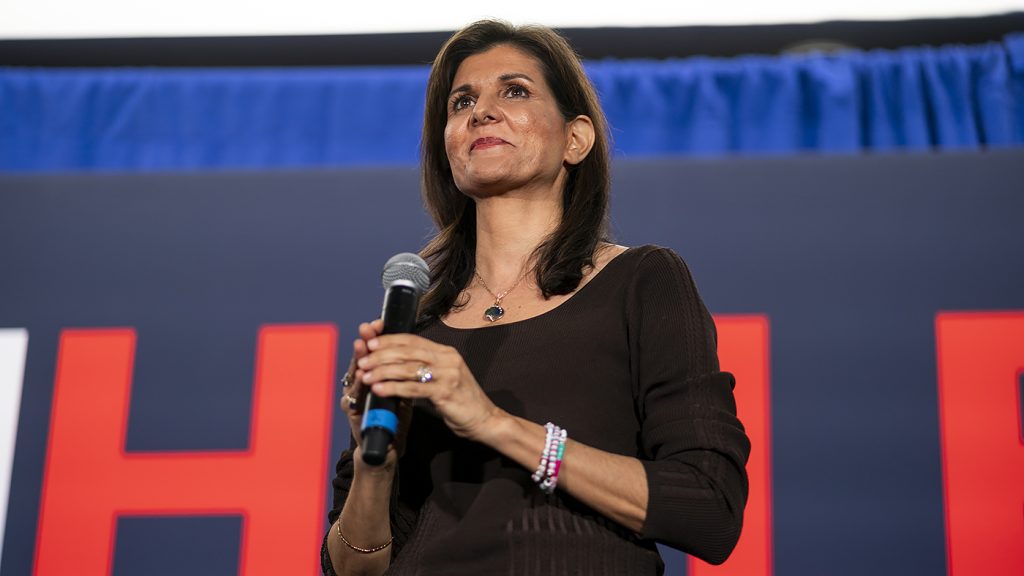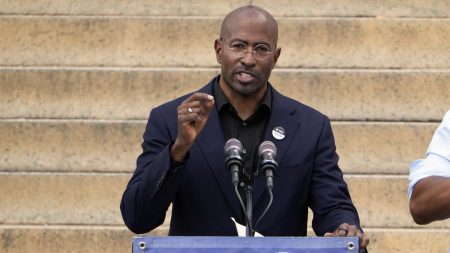Super Tuesday had a few unexpected events in a year when the presidential race seemed predictable.
President Biden and former President Trump didn’t have serious competition in their primaries, but that didn’t stop former U.N. Ambassador Nikki Haley and a mostly unknown Democrat from getting some attention.
Meanwhile, a protest vote caused disruption in a Democratic primary, and in North Carolina, an incumbent was defeated by a college student.
Here’s a look at several surprises from Super Tuesday.
An obscure Democrat beats Biden in American Samoa
Jason Palmer, a very unlikely Democratic candidate who was almost unknown before Tuesday, pulled off a shocking upset in American Samoa by defeating Biden in the U.S. territory’s Democratic caucus.
Palmer, an entrepreneur and investor, handed Biden his first loss in a Democratic nominating contest this cycle.
The results in the U.S. territory are unlikely to affect Biden, as he’s expected to win the party’s nomination. Nonetheless, Palmer’s win was considered a significant embarrassment for the Biden campaign.
American Samoa’s Democratic caucus is set to allocate three delegates to Palmer and three to Biden.
Palmer recognized on his website's FAQ section that he was improbable to beat Biden for the Democratic nomination and said his campaign focused more on ideas and solutions.
“Biden’s chances of a second term are declining, but not because of my campaign,” he wrote in the FAQ section. “According to the Reuters poll this month, 56% of Americans polled disapprove of his leadership. Several other polls, even one at Quinnipiac University, indicate that more than 7 in 10 independents desire other candidates to enter the 2024 presidential race.”
“I do not believe we have to concede the White House to a Republican Administration without having a robust debate that includes a positive, optimistic vision forward — we can and must do better for America,” he added.
Haley wins her first state in the GOP primary
The former U.N. ambassador won her first state GOP nominating contest on Tuesday by taking the Vermont GOP primary in a surprise victory over Trump.
Before Tuesday, Haley had only won the GOP nominating contest in Washington, D.C. At the time of publication, Haley was expected to receive at least 9 delegates in the state out of the 17 available, according to Decision Desk HQ.
At the same time, Super Tuesday made it clear that the GOP is still largely Trump's as he gets closer to winning the Republican nomination. Super Tuesday was the last chance for Haley to slow down some of the former president’s momentum, and she failed to win in several other states that could have been favorable to her, like Virginia or Massachusetts.
Yet Haley’s campaign wasn’t ready to give up yet.
“We’re honored to have received the support of millions of Americans across the country today, including in Vermont where Nikki became the first Republican woman to win two presidential primary contests,” said Haley campaign spokeswoman Olivia Perez-Cubas in a statement.
“Unity is not achieved by simply saying ‘we’re united.’ Currently, in state after state, there is still a large group of Republican primary voters who have deep concerns about Donald Trump,” she said. “That is not the unity our party needs for success. Addressing the concerns of those voters will make the Republican Party and America better.”
A member of Generation Z who is running for office surprisingly defeated an incumbent
In a state House primary on Tuesday, a young candidate from Generation Z in North Carolina achieved a remarkable victory against a long-serving incumbent.
Wyatt Gable, a junior at East Carolina University, won the Republican primary against state Rep. George Cleveland (R) in the state House District 14. The election results from the North Carolina State Board of Elections revealed that Gable won against Cleveland by 95 votes, receiving 2,461 ballots while Cleveland got 2,366.
While state legislative races are usually not very exciting, Gable’s victory against the Republican state lawmaker, who has been in office since 2004, indicates the growing number of Generation Z candidates.
Gable will now compete in the November general election against Democratic challenger Carmen Spicer.
An unexpected protest vote performs well in Minnesota
In Minnesota, pro-Palestinian Democrats expressed their views by casting nearly 45,000 votes for “uncommitted” in the Democratic primary to protest the Biden administration’s handling of the Israel-Hamas war.
Party members sought to replicate a protest vote during Michigan’s Democratic primary last week, when 101,000 Democrats voted for “uncommitted” against Biden, which made up roughly 13 percent of the vote. Although fewer Democrats voted for “uncommitted” in Minnesota, they represented a larger portion of the primary vote at 19 percent.
The “uncommitted” choice will be given two delegates in Michigan and four in Minnesota.
Despite Biden winning by a large margin in both states – receiving 70 percent of the vote in Minnesota and 81 percent in Michigan – party members aim to send a strong message to the Biden administration regarding the international conflict.
The U.S. has been involved in discussions regarding a potential temporary cease-fire, although a deal has not yet been reached between Israel and Hamas. Vice President Harris called for an immediate six-week cease-fire while in Alabama over the weekend.









